|
|
|
Sort Order |
|
|
|
Items / Page
|
|
|
|
|
|
|
| Srl | Item |
| 1 |
ID:
129247
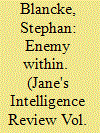

|
|
|
| 2 |
ID:
115013


|
|
|
|
|
| Publication |
2012.
|
| Summary/Abstract |
This paper argues that Malaysia-Indonesia relations have become increasingly problematic and complex to manage in a post-Mahathir/Suharto era. The unequal pace of the democratization pattern in both countries has largely contributed to this state of affairs. The four key 'transnational' variables or determinants such as migrant labor, mass media, non-governmental organizations and the Anwar factor have significantly impacted on Malaysia's ties with Indonesia against the backdrop of the unequal domestic political changes. These four variables have over the years become more prominent in bilateral relations - often in negative terms. More specifically, they represent the dynamics of the people-to-people dimension in bilateral ties. As such, the deterioration in people-to-people relations threatens to significantly reshape government-to-government diplomacy. Bilateral relations could yet face their severest contradictions when official diplomacy is incapable of reflecting accurately popular sentiments. In effect, the roles of state and non-state actors have been instrumental in influencing recent developments of Malaysia-Indonesia relations.
|
|
|
|
|
|
|
|
|
|
|
|
|
|
|
|
| 3 |
ID:
140340
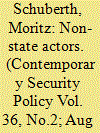

|
|
|
|
|
| Summary/Abstract |
The proliferation of irregular armed actors which defy simplistic definition has caught public and academic attention alike, not least in the pages of this journal. To move the debate on non-state armed groups (NSAGs) forward, this article seeks to enhance our conceptual understanding of parochial armed groups which are not primarily driven by ideological or religious objectives. Thus, this article clarifies similarities as well as differences between subtypes of community-based armed groups (CBAGs) on the one hand, and between CBAGs and other NSAGs, on the other hand. By doing so, a typology is developed that classifies militias, gangs and vigilantes on the basis of their political, economic and security-related dimensions. The resulting ideal types are discussed through the lenses of different explanatory frameworks and policy debates in the field of contemporary security studies. A major typological issue is the tendency for CBAGs to ‘turn bad’ and become threats to the stability they were expected to transform, becoming a serious problem in countries where they operate. It is concluded that the challenge of CBAGs ultimately needs to be addressed by putting in place a functioning state that can tackle the underlying woes that led to their proliferation in the first place.
|
|
|
|
|
|
|
|
|
|
|
|
|
|
|
|
| 4 |
ID:
087117


|
|
|
|
|
| Publication |
2009.
|
| Summary/Abstract |
The modern state is facing challenges from numerous non-state actors, ultimately leading to the erossion of state sovereignty, authority and legitimacy. This argument has been proved appropriate in the context of Pakistani state, which is fighting a crucial battle against fundamentalist Taliban and other sectarian and extremist groups. The forces of Talibanisation are defying the Pakistani Constitution and imosing Islamic in varous parts of the country. Violence breeds more violence; this is clearly visible in Pakistan where extremist group infighting is causing significant loss of life.
|
|
|
|
|
|
|
|
|
|
|
|
|
|
|
|
| 5 |
ID:
119262


|
|
|
|
|
| Publication |
2013.
|
| Summary/Abstract |
As China has become the largest greenhouse gas (GHG) emitter in terms of total annual emissions, to promote GHG emissions reduction in China turns out to be crucial to the success of the global efforts to address climate change. This paper explores the development of the Chinese Domestic Voluntary Carbon Market (DVCM) in order to understand how carbon trading institutions have emerged and developed in China. To do this, it traces and analyzes the roles of the Chinese government and other key actors. Through process tracing and literature review, it argues that the pre-legislation and territorially fragmented development pattern of the Chinese DVCM has resulted from the activities of Chinese local governments and non-state actors under the policy experimentation approach adopted by the Chinese central government. It concludes with brief comments on the Chinese policy experimentation approach, and suggests that some measures can be taken to promote voluntary emissions reduction and policy learning.
|
|
|
|
|
|
|
|
|
|
|
|
|
|
|
|
| 6 |
ID:
117203
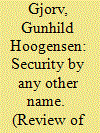

|
|
|
|
|
| Publication |
2012.
|
| Summary/Abstract |
This article examines the challenges and contradictions between some of the leading conceptions of security within the field of International Relations (IR), from those stating that the concept can only be employed by the state with regard to immediate, existential threats, to those that see security as the foundation of social life or as a human good. This article continues a discussion that has taken place in the Review of International Studies regarding the development of positive security, examining the potential use of the terms 'negative' and 'positive' security to bring clarity to these diverging security perspectives and to argue for a multi-actor security approach. It is argued that positive security perspectives, which rely on non-violent measures, ensure an emphasis upon context, values, and security practices that build trust, and by use of a multi-actor security model, shows the dynamics between state and non-state actors in the creation of security.
|
|
|
|
|
|
|
|
|
|
|
|
|
|
|
|
| 7 |
ID:
171255
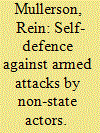

|
|
|
|
|
| Summary/Abstract |
Armed attacks in the sense of Article 51 and customary international law can be carried out not only by States, but also by non-State actors (NSA). Self-defensive responses to attacks by NSAs, due to their specific characteristics, may contain a combination of elements of anticipatory self-defence and defensive reprisals. If a State, from the territory of which an attack originates, is unable to prevent an NSA attacking a third State, it has to ask for and to accept the assistance of the victim State, other States, or relevant international organisations. The latter cannot use military force in self-defence in such circumstances without having first sought the consent of the territorial State. However, if a State is unwilling to prevent an NSA, operating from its territory, from attacking third States, it becomes an accessory-after-the-fact to armed attacks of the NSA. Self-defensive, either individual or collective, measures can be carried out on the territory of such a State even without its consent.
|
|
|
|
|
|
|
|
|
|
|
|
|
|
|
|
| 8 |
ID:
146576
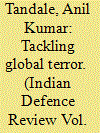

|
|
|
|
|
| Contents |
The states which are nurturing and nursing terrorists must be held responsible for the conduct of non-state actors because they operate from within the territorial boundaries of the host country. Every state is bound to respect the sovereignty of other countries, and hence these states cannot avoid its liability by any excuses. India’s vital interests can be better served by invoking the expanded doctrine of offensive self-defence, which has witnessed a normative evolution, particularly in relation to non-state actor, following the events of September 11, 2001. This expanded doctrine, has also gained acceptance of the Western power and scholars which permit the victim states to use force against non-state actors and breach the territorial sovereignty of foreign states in response to an accumulation of terrorist attacks.
|
|
|
|
|
|
|
|
|
|
|
|
|
|
|
|
|
|
|
|
|